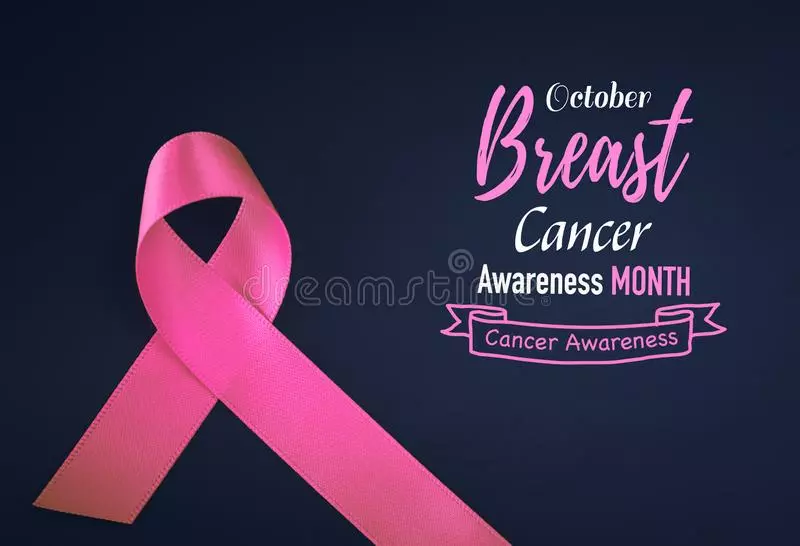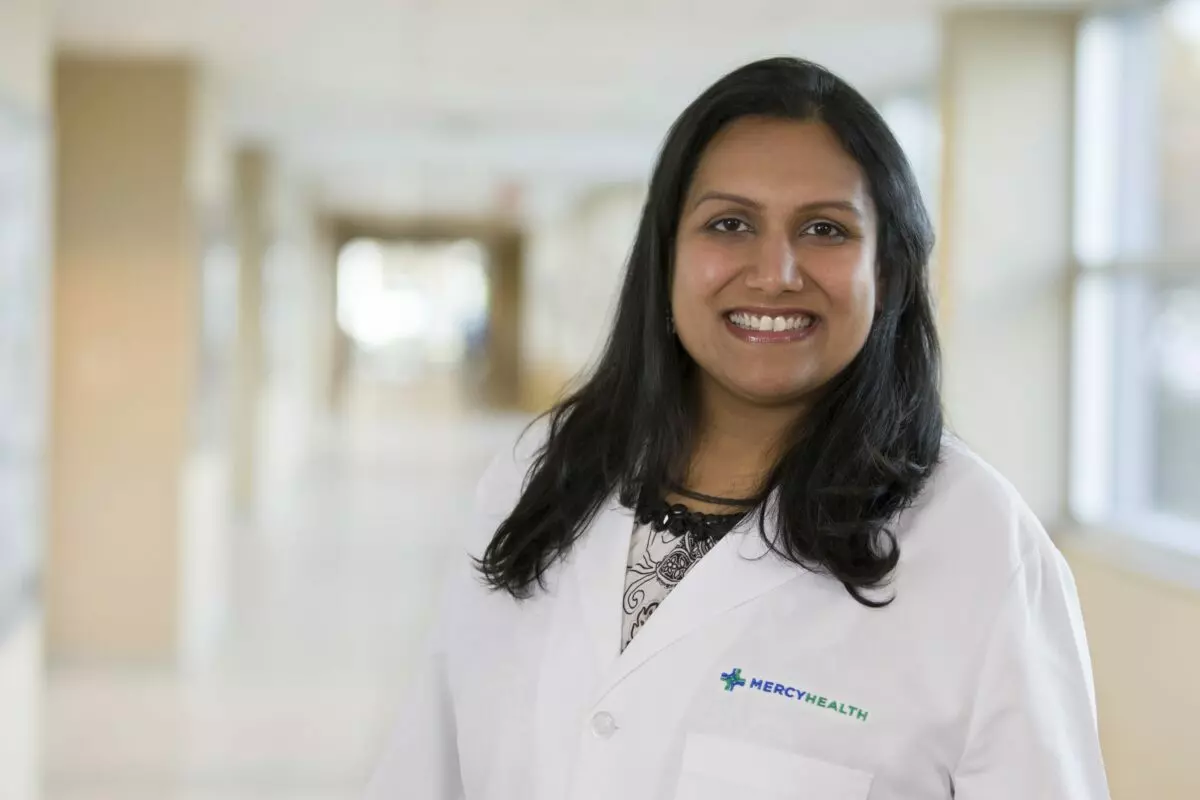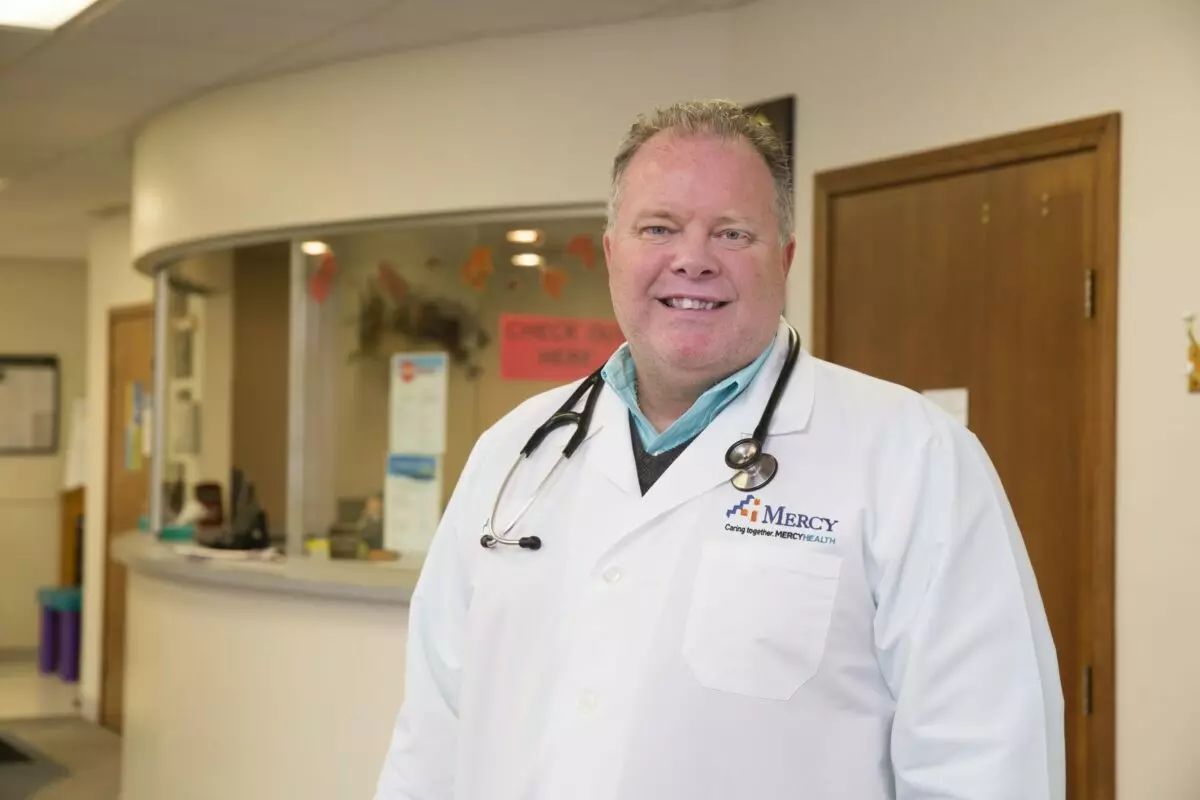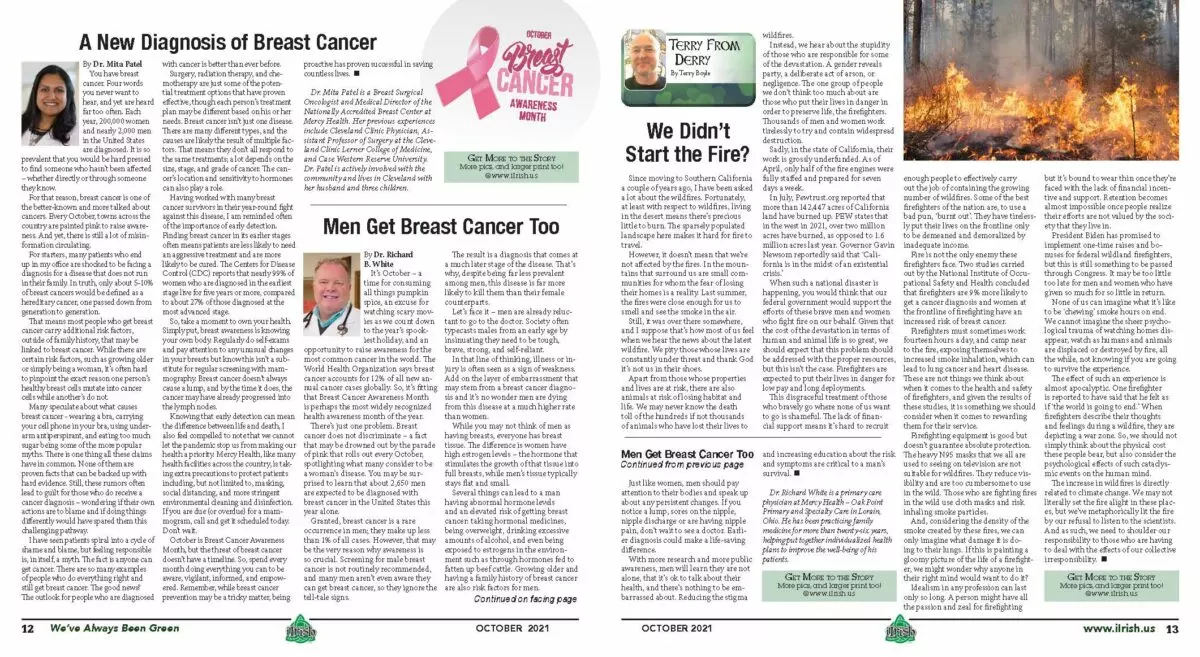
Health Matters: A New Diagnosis of Breast Cancer
By Dr. Mita Patel
You have breast cancer. Four words you never want to hear, and yet are heard far too often. Each year, 200,000 women and nearly 2,000 men in the United States are diagnosed. It is so prevalent that you would be hard-pressed to find someone who hasn’t been affected – whether directly or through someone they know.
For that reason, breast cancer is one of the better-known and more talked about cancers. Every October, towns across the country are painted pink to raise awareness. And yet, there is still a lot of misinformation circulating.
For starters, many patients who end up in my office are shocked to be facing a diagnosis for a disease that does not run in their family. In truth, only about 5-10% of breast cancers would be defined as a hereditary cancer, one passed down from generation to generation.
That means most people who get breast cancer carry additional risk factors, outside of family history, that may be linked to breast cancer. While there are certain risk factors, such as growing older or simply being a woman, it’s often hard to pinpoint the exact reason one person’s healthy breast cells mutate into cancer cells while another’s do not.
Many speculate about what causes breast cancer – wearing a bra, carrying your cell phone in your bra, using underarm antiperspirant, and eating too much sugar being some of the more popular myths. There is one thing all these claims have in common. None of them are proven facts that can be backed up with hard evidence. Still, these rumors often lead to guilt for those who do receive a cancer diagnosis – wondering if their own actions are to blame and if doing things differently would have spared them this challenging pathway.
I have seen patients spiral into a cycle of shame and blame, but feeling responsible is, in itself, a myth. The fact is anyone can get cancer. There are so many examples of people who do everything right and still get breast cancer. The good news? The outlook for people who are diagnosed with cancer is better than ever before.
Surgery, radiation therapy, and chemotherapy are just some of the potential treatment options that have proven effective, though each person’s treatment plan may be different based on his or her needs. Breast cancer isn’t just one disease. There are many different types, and the causes are likely the result of multiple factors. That means they don’t all respond to the same treatments; a lot depends on the size, stage, and grade of cancer. The cancer’s location and sensitivity to hormones can also play a role.
Having worked with many breast cancer survivors in their year-round fight against this disease, I am reminded often of the importance of early detection. Finding breast cancer in its earlier stages often means patients are less likely to need an aggressive treatment and are more likely to be cured. The Centers for Disease Control (CDC) reports that nearly 99% of women who are diagnosed in the earliest stage live for five years or more, compared to about 27% of those diagnosed at the most advanced stage.
So, take a moment to own your health. Simply put, breast awareness is knowing your own body. Regularly do self-exams and pay attention to any unusual changes in your breasts but know this isn’t a substitute for regular screening with mammography. Breast cancer doesn’t always cause a lump, and by the time it does, the cancer may have already progressed into the lymph nodes.
Knowing that early detection can mean the difference between life and death, I also feel compelled to note that we cannot let the pandemic stop us from making our health a priority. Mercy Health, like many health facilities across the country, is taking extra precautions to protect patients including, but not limited to, masking, social distancing, and more stringent environmental cleaning and disinfection. If you are due (or overdue) for a mammogram, call and get it scheduled today. Don’t wait.
October is Breast Cancer Awareness Month, but the threat of breast cancer doesn’t have a timeline. So, spend every month doing everything you can to be aware, vigilant, informed, and empowered. Remember, while breast cancer prevention may be a tricky matter, being proactive has proven successful in saving countless lives.

*Dr. Mita Patel is a Breast Surgical Oncologist and Medical Director of the Nationally Accredited Breast Center at Mercy Health. Her previous experiences include Cleveland Clinic Physician, Assistant Professor of Surgery at the Cleveland Clinic Lerner College of Medicine, and Case Western Reserve University. Dr. Patel is actively involved with the community and lives in Cleveland with her husband and three children.
Health Matters: Men Get Breast Cancer Too
By Dr. Richard B. White
It’s October – a time for consuming all things pumpkin spice, an excuse for watching scary movies as we count down to the year’s spookiest holiday, and an opportunity to raise awareness for the most common cancer in the world. The World Health Organization says breast cancer accounts for 12% of all new annual cancer cases globally. So, it’s fitting that Breast Cancer Awareness Month is perhaps the most widely recognized health awareness month of the year.
There’s just one problem. Breast cancer does not discriminate – a fact that may be drowned out by the parade of pink that rolls out every October, spotlighting what many consider to be a woman’s disease. You may be surprised to learn that about 2,650 men are expected to be diagnosed with breast cancer in the United States this year alone.
Granted, breast cancer is a rare occurrence in men; they make up less than 1% of all cases. However, that may be the very reason why awareness is so crucial. Screening for male breast cancer is not routinely recommended, and many men aren’t even aware they can get breast cancer, so they ignore the tell-tale signs.
The result is a diagnosis that comes at a much later stage of the disease. That’s why, despite being far less prevalent among men, this disease is far more likely to kill them than their female counterparts.
Let’s face it – men are already reluctant to go to the doctor. Society often typecasts males from an early age by insinuating they need to be tough, brave, strong, and self-reliant.
In that line of thinking, illness or injury is often seen as a sign of weakness. Add on the layer of embarrassment that may stem from a breast cancer diagnosis and it’s no wonder men are dying from this disease at a much higher rate than women.
While you may not think of men as having breasts, everyone has breast tissue. The difference is women have high estrogen levels – the hormone that stimulates the growth of that tissue into full breasts, while men’s tissue typically stays flat and small.
Several things can lead to a man having abnormal hormone levels and an elevated risk of getting breast cancer: taking hormonal medicines, being overweight, drinking excessive amounts of alcohol, and even being exposed to estrogens in the environment such as through hormones fed to fatten up beef cattle. Growing older and having a family history of breast cancer are also risk factors for men.
Just like women, men should pay attention to their bodies and speak up about any persistent changes. If you notice a lump, sores on the nipple, nipple discharge or are having nipple pain, don’t wait to see a doctor. Earlier diagnosis could make a life-saving difference.
With more research and more public awareness, men will learn they are not alone, that it’s ok to talk about their health, and there’s nothing to be embarrassed about. Reducing the stigma and increasing education about the risk and symptoms are critical to a man’s survival.

*Dr. Richard White is a primary care physician at Mercy Health – Oak Point Primary and Specialty Care in Lorain, Ohio. He has been practicing family medicine for more than twenty-six years, helping put together individualized health plans to improve the well-being of his patients.





